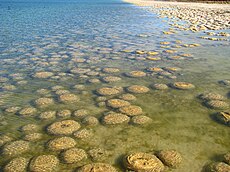
Back أصل الحياة Arabic اصل الحياه ARZ Узнікненне жыцця BE Произход на живота Bulgarian জীবনের উৎপত্তি Bengali/Bangla Origen de la vida Catalan Vznik života Czech Origino de la vivo EO Elu teke ET Biziaren jatorria EU


The origin of life on Earth is a scientific problem which is not yet solved. There are many ideas, but few clear facts.[1]
Most experts agree that all life today evolved by common descent from a single primitive lifeform.[2] It is not known how this early life form evolved, but scientists think it was a natural process which happened about 3,900 million years ago. This is in accord with the philosophy of naturalism: only natural causes are admitted.
It is not known if metabolism came first or genetics. The main hypothesis which supports genetics first is the RNA world hypothesis, and the one which supports metabolism first is the protein world hypothesis.
Another big problem is how cells developed.[3] Melvin Calvin, winner of the Nobel Prize in Chemistry, wrote a book on the subject,[4] and so did Alexander Oparin.[5] What links most of the early work on the origin of life is the idea that before life began there must have been a process of chemical change.[6] Another question which has been discussed by J.D. Bernal and others is the origin of the cell membrane. By concentrating the chemicals in one place, the cell membrane performs a vital function.[7]
What we call life has only been verified in things that include RNA, mechanisms for encoding and decoding RNA, and mechanisms for building proteins from amino acids.
- ↑ Schopf, J. William (ed) 2002. Life's origin: the beginnings of biological evolution. University of California Press. ISBN 0-520-23391-3. A recent survey of the field.
- ↑ Steel, Mike & Penny, David 2010 (2010). "Origins of life: common ancestry put to the test". Nature. 465 (7295): 168–9. Bibcode:2010Natur.465..168S. doi:10.1038/465168a. ISSN 0028-0836. PMID 20463725. S2CID 205055573.
{{cite journal}}: CS1 maint: multiple names: authors list (link) CS1 maint: numeric names: authors list (link) - ↑ Robinson R. 2005. Jump-starting a cellular world: investigating the origin of life, from soup to networks PLoS 3 (11) [1] Archived 2014-12-24 at the Wayback Machine
- ↑ Calvin, Melvin. 1969. Chemical evolution: molecular evolution towards the origin of living systems on the earth and elsewhere. Oxford University Press. ISBN 0198553420
- ↑ Oparin, Alexander Ivanovich 2003. The Origin of Life. Courier Dover. ISBN 978-0-486-49522-4
- ↑ Oro, John 2002. Historical understanding of life's beginnngs. In Schopf J. (ed) Life's origin: the beginnings of biological evolution. University of California Press. ISBN 0-520-23391-3
- ↑ Bernal J.D. 1967. The origin of life. Cleveland: World Publishing.